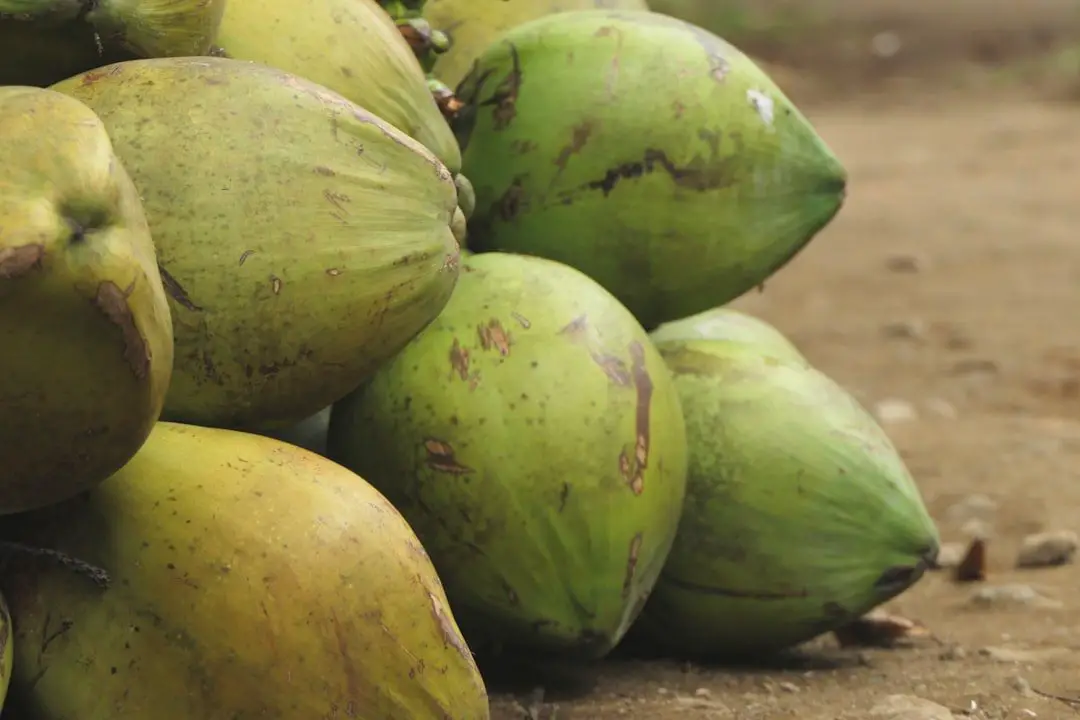
Coconut has become a staple ingredient in many households around the world, and its popularity has been steadily increasing in recent years. From coconut water to coconut oil, this versatile fruit has found its way into our kitchens, our beauty routines, and even our sports drinks. In this blog post, we will explore the various health benefits of coconut, its nutritional value, and its many uses in cooking and baking. We will also delve into the rise of coconut water as a popular beverage, the trend of using coconut oil for skincare and haircare, and the growing demand for coconut milk and cream as a dairy-free alternative. Additionally, we will discuss the sustainable and ethical sourcing of coconut products and the history and cultural significance of coconut in different regions. By the end of this article, you will have a comprehensive understanding of why coconut has become such a craze and its potential future in the food industry.
Key Takeaways
- Coconut is a popular ingredient in the food industry due to its versatility and health benefits.
- Coconut is rich in nutrients and can be used in cooking, baking, and as a beverage.
- Coconut oil has become a trend due to its many uses, including skincare and haircare.
- Coconut milk and cream are in high demand for vegan and dairy-free alternatives.
- The sustainable and ethical sourcing of coconut products is important for the industry’s future.
The Health Benefits of Coconut and Its Nutritional Value
Coconut is not only delicious but also packed with numerous health benefits. One of the key benefits of coconut is its high fiber content. Fiber is essential for maintaining a healthy digestive system and can help prevent constipation. Additionally, coconut contains medium-chain triglycerides (MCTs), which are easily digested and can boost metabolism. This means that consuming coconut can help you burn more calories throughout the day.
In terms of nutritional value, coconut is rich in vitamins and minerals. It is a good source of vitamin C, which is important for immune function and collagen production. Coconut also contains minerals such as potassium, magnesium, and iron. Potassium is essential for maintaining proper heart function and regulating blood pressure, while magnesium plays a role in bone health and energy production. Iron is necessary for the production of red blood cells and preventing anemia.
The Versatility of Coconut in Cooking and Baking
One of the reasons coconut has gained such popularity is its versatility in cooking and baking. Coconut can be used in a variety of dishes, from savory curries to sweet desserts. In savory dishes, coconut milk or cream is often used as a base for curries, soups, and stews. It adds a creamy texture and a subtle sweetness to the dish. Coconut oil is also commonly used for sautéing vegetables or as a replacement for butter in baking.
In baking, coconut can be used in various forms. Shredded coconut can be added to cookies, cakes, and muffins for added texture and flavor. Coconut flour, which is made from dried coconut meat, is a popular gluten-free alternative to regular flour. It adds a nutty flavor and a light texture to baked goods. Coconut sugar, which is derived from the sap of coconut palm trees, is a healthier alternative to refined sugar. It has a lower glycemic index and contains more nutrients than regular sugar.
The Rise of Coconut Water as a Popular Beverage
| Year | Coconut Water Sales (in millions) | Percentage Increase from Previous Year |
|---|---|---|
| 2010 | 50 | N/A |
| 2011 | 100 | 100% |
| 2012 | 200 | 100% |
| 2013 | 400 | 100% |
| 2014 | 800 | 100% |
| 2015 | 1,600 | 100% |
| 2016 | 3,200 | 100% |
| 2017 | 6,400 | 100% |
| 2018 | 12,800 | 100% |
| 2019 | 25,600 | 100% |
Coconut water has become increasingly popular as a beverage in recent years. It is the clear liquid found inside young coconuts and is often referred to as “nature’s sports drink.” One of the main health benefits of coconut water is its ability to hydrate the body. It contains electrolytes such as potassium, sodium, and magnesium, which are essential for maintaining proper hydration levels.
Coconut water is also low in calories and naturally sweet, making it a healthier alternative to sugary beverages. Many athletes and fitness enthusiasts have started using coconut water as a natural way to replenish electrolytes after intense workouts. It is also a popular choice for those looking to cut back on sugary drinks or soda.
The Coconut Oil Trend and Its Many Uses
Coconut oil has become a staple in many households due to its numerous uses and health benefits. It is a versatile oil that can be used for cooking, skincare, and haircare. In cooking, coconut oil is often used as a replacement for other oils or butter. It has a high smoke point, which means it can withstand high temperatures without breaking down and releasing harmful compounds. Coconut oil adds a subtle coconut flavor to dishes and can be used in both sweet and savory recipes.
In terms of skincare, coconut oil is known for its moisturizing properties. It can be used as a natural moisturizer for the face and body, as well as a makeup remover. Coconut oil is also commonly used as a hair treatment to nourish and condition the hair. It can be applied as a pre-shampoo treatment or used as a leave-in conditioner to add shine and reduce frizz.
However, it is important to note that there is some controversy surrounding the health benefits of coconut oil. While it is high in saturated fat, which was once believed to be unhealthy, recent research suggests that not all saturated fats are created equal. Some studies have shown that the specific type of saturated fat found in coconut oil, known as lauric acid, may have positive effects on cholesterol levels. However, more research is needed to fully understand the impact of coconut oil on health.
The Growing Demand for Coconut Milk and Cream

Coconut milk and cream have become increasingly popular as dairy-free alternatives in cooking and baking. While they are often used interchangeably, there is a slight difference between the two. Coconut milk is made by blending the meat of mature coconuts with water and then straining it to remove any solids. It has a thinner consistency and is commonly used in soups, curries, and smoothies.
On the other hand, coconut cream is made by simmering coconut milk until most of the water evaporates, leaving behind a thick, creamy texture. It has a higher fat content than coconut milk and is often used in desserts, such as ice cream and puddings. Coconut cream can also be whipped and used as a dairy-free alternative to whipped cream.
The demand for coconut milk and cream has grown as more people are looking for dairy-free alternatives due to lactose intolerance or dietary preferences. Coconut milk and cream add a rich, creamy texture to dishes and can be used in both sweet and savory recipes.
The Best Coconut-Based Recipes to Try at Home
Now that we have explored the various uses of coconut in cooking and baking, let’s take a look at some popular coconut-based recipes that you can try at home.
1. Coconut Curry: Coconut curry is a classic dish that combines the flavors of coconut milk, spices, and vegetables or meat. It is a versatile dish that can be customized to your taste preferences. You can make a Thai-inspired curry with red or green curry paste, or a more mild Indian curry with spices like turmeric, cumin, and coriander. Serve it over rice or with naan bread for a satisfying meal.
2. Coconut Macaroons: Coconut macaroons are a simple yet delicious treat that can be made with just a few ingredients. They are made by combining shredded coconut, sweetened condensed milk, egg whites, and vanilla extract. The mixture is then shaped into small mounds and baked until golden brown. These macaroons are chewy on the inside and crispy on the outside, making them the perfect sweet treat.
3. Coconut Smoothie: A coconut smoothie is a refreshing and nutritious way to start your day or refuel after a workout. Simply blend together coconut milk or water, frozen fruit of your choice, a handful of spinach or kale for added nutrients, and a scoop of protein powder if desired. You can also add a tablespoon of coconut oil for an extra boost of healthy fats.
These are just a few examples of the many delicious coconut-based recipes you can try at home. Get creative and experiment with different flavors and ingredients to find your favorite coconut creations.
The Sustainable and Ethical Sourcing of Coconut Products
As the demand for coconut products continues to grow, it is important to consider the sustainability and ethical sourcing of these products. Coconut farming can have a significant impact on the environment, as well as the communities that rely on coconut production for their livelihoods.
Sustainable sourcing of coconut products involves practices that minimize environmental impact, such as using organic farming methods, conserving water, and protecting biodiversity. It also involves ensuring fair wages and safe working conditions for farmers and workers involved in the production process.
When purchasing coconut products, look for certifications such as Fair Trade or Rainforest Alliance, which indicate that the product has been sourced sustainably and ethically. These certifications ensure that farmers are paid fair prices for their products and that environmental standards are met.
The History and Cultural Significance of Coconut in Different Regions
Coconut has a long history and holds cultural significance in many regions around the world. In Southeast Asia, coconuts have been used for centuries as a source of food, medicine, and building materials. They are often referred to as the “tree of life” due to their many uses. In countries like Thailand, Indonesia, and the Philippines, coconuts are a staple ingredient in traditional dishes such as curries, soups, and desserts.
In the Caribbean, coconuts have played a significant role in the culinary traditions of countries like Jamaica, Trinidad, and Barbados. Coconut milk is commonly used in dishes such as rice and peas, curry goat, and coconut bread. Coconuts are also used to make refreshing beverages like coconut water and coconut rum.
In addition to its culinary uses, coconuts have been used for centuries in traditional medicine. In Ayurvedic medicine, coconuts are believed to have cooling properties and are used to balance the body’s doshas. In traditional Chinese medicine, coconut is used to nourish the yin and promote healthy digestion.
The Enduring Appeal of Coconut and Its Future in the Food Industry
In conclusion, coconut has become a popular ingredient in many households due to its numerous health benefits, versatility in cooking and baking, and cultural significance in different regions. From coconut water to coconut oil, this tropical fruit has found its way into our kitchens, our beauty routines, and even our sports drinks. While there is some controversy surrounding the health benefits of coconut oil, the overall appeal of coconut remains strong.
As consumers become more conscious of their health and the environmental impact of their choices, the demand for sustainably and ethically sourced coconut products is likely to continue to grow. The versatility of coconut in cooking and baking also ensures that it will remain a staple ingredient in many households. Whether you’re using coconut milk in a curry or coconut oil in your skincare routine, there’s no denying the enduring appeal of this tropical fruit. So go ahead, embrace the coconut craze and enjoy all the delicious and nutritious benefits it has to offer.
If you’re a fan of coconut flavoring, you’ll definitely want to check out this article on Flavorful Sips: “Exploring the Berry Bar: A Haven for Fruit Lovers.” It’s a fascinating read that delves into the world of fruit-infused beverages and highlights the unique and refreshing flavors available at the Berry Bar. From coconut-infused smoothies to tropical cocktails, this article will surely satisfy your craving for all things coconut. So, grab a drink and dive into this fruity adventure! Read more



